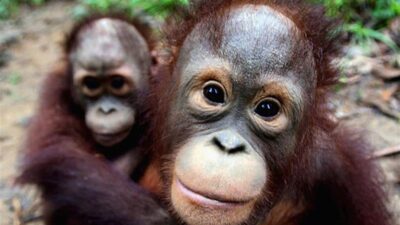A recently as 1996, the scientific community assumed there were only one species of orangutan. These critically endangered great apes are some of our closest evolutionary relatives so it is somewhat surprising that experts only realized there were more than one variety a mere twenty five years ago. Matters became more biologically embarrassing in 2017 when a third species was identified in the forests of Sumatra, numbering less than 800 and occupying an area smaller than London.
How does such an obvious piece of knowledge go unnoticed for so long? Scientists like all of us are prisoners of our own worldview. The apparently easy assumption that all arboreal orange-haired apes in southeast Asia are somehow the same was never upended until relatively recently. This is not good news for conservation since saving these magnificent creatures from the pedestrian perils of palm oil production means having basic knowledge about their biology. Until recently, zoos were unwittingly confining different orangutan species together in doomed captive breeding programs.
Philosophically, this remarkable oversight illustrates two important truths. First, the pervasive confines of our umwelt restrains even those trained to see the world as objectively as possible. While the world is not awash in orangutan experts, even within this cohort one of the most obvious observations somehow went unnoticed until there are almost no individuals in the wild left to study.
Secondly, the unexpected diversity of one of our closest relatives provides additional evidence that apart from our vast competitive success over other living things, we are not as special as we seem. Evolution among other hominids was heading in a similar direction along many different branches. If our ancestors had not stumbled upon such accidental brain-scaling breakthroughs as cooking, some other species eventually would have crossed this threshold. Intelligence is metabolically expensive but for many creatures is obviously a worthwhile and emergent evolutionary investment. In our case, it was a planetary game-changer simply because we happened first through the door to an ecological banquet with an open bar and buffet.
While it is useful to look backwards through the evolutionary record, it is also illuminating to remember that species development never stops either. The conceit of permanence has no basis in what we know to be true about biology. Would humans one million years from now also be "human"? Our ancestors that far in the past would definitely not look like someone most of us would choose to swipe right for on Tinder. Millions of years in either direction, even along our own evolutionary path, would produce different physical bodies, mental capacities and of course umwelt.
If being human is neither unique nor permanent, what then is special about us? Like our close orangutan relatives, or very distant relations like the octopus, we somehow share the precious quality of sentience that seems exceedingly rare in the universe. Decades of searching the sky for radio evidence of intelligent life elsewhere in the cosmos has so far proven fruitless. However we share our own planet with numerous evolutionary examples of emergent awareness. The conditions needed to nurture sentience seem very uncommon, but as evidenced on our own planet, the development of sentience itself is not.
The theological concept of the immortal human soul has fallen out of fashion in the modern world, unable to withstand the winds of rational scientific inquiry. Maybe this ancient ontological construct requires updating rather than discarding. What if instead we let go of the qualifiers of "immortal" and "human"? There seems something undeniably sacred about regarding another self-aware being, human or otherwise. Perhaps each of us regards existence by virtue of a sentient soul - not immortal, not supernatural, not necessarily human - but sacred nonetheless. Would an AI be any different?